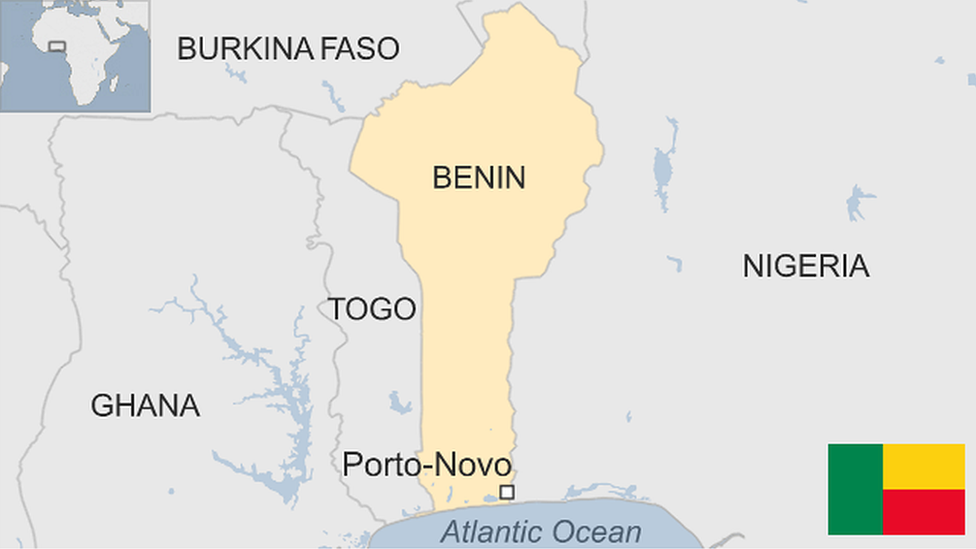Benedict XVI in Benin: The Pope's growing African flock
- Published
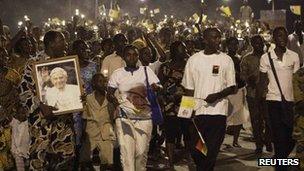
Africa has the Roman Catholic church's fastest growing congregation.
Why should Pope Benedict want to travel nearly 10,000km (6,000 miles) on a weekend visit to Africa?
The basic reason is that his Catholic flock in Africa has increased faster there than in any other part of the world during the past 50 years.
The Pope has just been forced to set up a new programme of evangelisation in Europe, where Catholics have been leaving the church in ever greater numbers.
In Europe there is a serious problem of renewing an ageing priesthood.
In West Africa his flock is flourishing, despite antagonism and even violence between Christians and Muslims in several countries. New vocations are booming.
The Ouidah Catholic seminary is the burgeoning training ground for new African priests who - 150 years after the first Catholic missionaries from Switzerland established themselves there - are prepared to reverse the missionary direction and carry out pastoral work among Europeans in Europe.
Voodoo heartland
But Ouidah is also a centre for traditional African religions. It is the heartland of Voodoo, whose rituals and beliefs travelled to the Caribbean and to South America, particularly Brazil, during the centuries when slavery depopulated West Africa.
There is still a Voodoo temple filled with sacred pythons in Ouidah, not far from the huge Catholic seminary.
Voodoo is a belief system with a culture which includes art, dance, music, rituals, medicine, and is expressed in several languages.
Nearly half the population of Benin still follow traditional African animist religions such as Voodoo. Many who have converted to Catholicism still refuse to abandon their former beliefs entirely.
The Catholic Church however has a problem with this. It is called syncretism, which means treating all religions on the same footing.
Right-wing Catholic traditionalists denounced the late Pope John Paul II for allegedly "consorting with Satan" when he invited an African animist to take part in his groundbreaking interfaith prayer for world peace in the Italian city of Assisi, the shrine of Saint Francis, back in 1986.
Pope John Paul's successor, Benedict, invited another African traditional religious leader to celebrate with him the 25th anniversary of that meeting only last month. But this time there were no public prayers together, only private meditation.
The Catholic Church, which cannot tolerate the idea of Protestants and Catholics sharing the same communion table, has even greater difficulty in reconciling the worship of Jesus Christ side-by-side with African animists offering libations to spirits of the forest.
Large retinue
The Pope travelled to Cotonou, the economic capital of Benin, with a larger retinue of advisers than usual on his travels.
All the senior Vatican Cardinals who work in the Roman Curia were invited by the pope to join him for the six-hour flight.
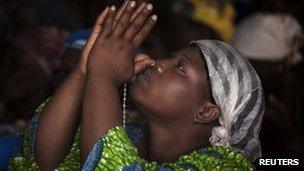
Benin is a stronghold of Catholicism in West Africa.
They included Cardinal Peter Appiah Turkson from Ghana, the head of the Vatican's Council for Justice and Peace, the body which monitors human rights records not only in African countries but around the world.
Cardinal Turkson is the first Ghanaian to be appointed to the highest rank of prelates in the Catholic Church. He is even considered to be a possible candidate to succeed Benedict XVI, when the 84-year-old pontiff dies.
Another member of the Pope's retinue is Bishop Barthelemy Adoukonou, a former student of the Pope at the University of Regensburg in Germany, where he taught theology. Monsignor Adoukonou, promoted to the rank of Bishop as recently as last month, is rapidly gaining influence as an adviser in the highest ranks of the Roman Curia.
Sick children
One of Pope Benedict's restricted number of engagements in Benin - but one to which he to which he attaches great importance - is a meeting with 200 sick and disabled children, who are looked after by Catholic missionaries.
He will address all the suffering children of Africa in a speech he plans to make where they live.
Another high point of Pope Benedict's visit to Benin will be a meeting with the head of state, members of the government and members of the diplomatic corps in the presidential palace.
About 3,000 people are expected to attend and Pope Benedict plans another keynote speech, in which he will refer to the many human rights abuses in Africa.
He will refer also to the role of the Church during the democratisation of the country, following Marxist rule after its independence.
Here, he also plans to greet some local leaders of traditional African religions who have been invited for the occasion.
Vatican Radio has produced its first music CD on the occasion of the Pope's African visit.
Five thousand copies will be distributed to representatives of local churches. It is called Afrika Tenda Amani and has been recorded by two popular West African musicians Papa Wemba and Bonga.
- Published18 November 2011
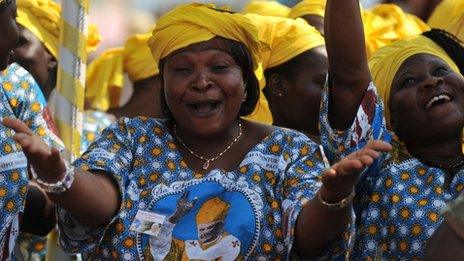
- Published2 May 2013
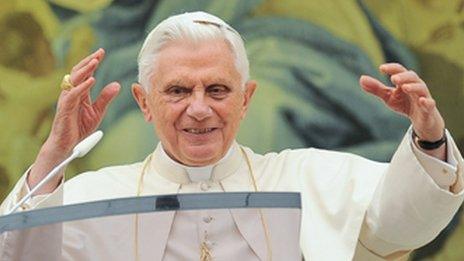
- Published28 July 2023
